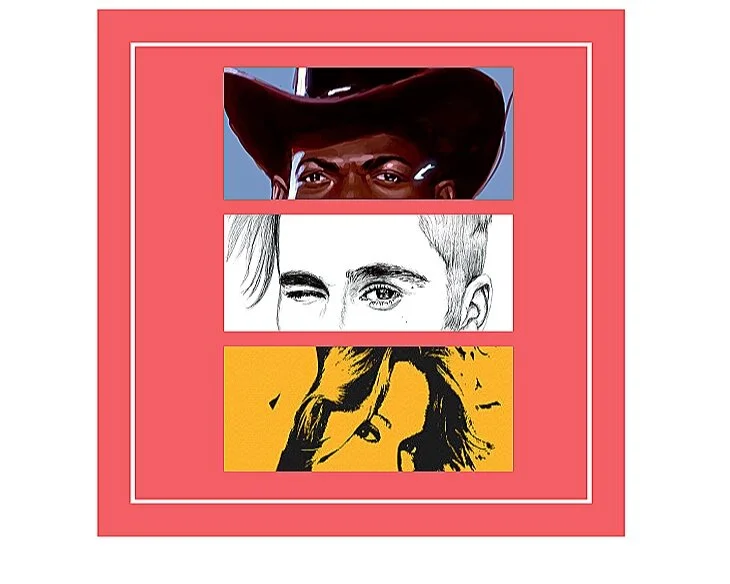Review (Music): Glitter, a Clutter
READING TIME: 5 MINUTES
FROM AN ARTISTIC PERPSECTIVE...
In retrospect the album provides tasteful glimpses to the funk and glitz of the 80s. However, during its release the then 31 year old Carey comes across overusing the sampling technique (frequent in 80s and 90s hip-hop) and forcing nostalgia upon a consumer group who barely have had time to let that decade of music sink in and fully appreciate it. If a star of her calibre today were to release a similar project noting the sound of the early 00s it would come across as patronising, lazy and nostalgia-baiting so its easy to see why critics weren’t too enamoured with the project at first. Instead of paying respect to music from the past music of the millennium was about pushing forwards and developing new sounds and ideas; this is something Carey began to accomplish during Daydream with her remixes and so developing an evolution in her sound, but this hindered around Rainbow with more lacklustre hits than innovative ones. On the other hand it’s admirable to see Carey stuck to her guns in attempting to creative a cohesive piece of work. It can be difficult with all the pressure that was put upon her to try and satisfy everybody’s desires.
Glitter sonically did make Carey stand out of the crowd at the time. Its new fusion of 80s vs 00s production for an R&B/Hip-Hop songstress was uncommon for its time and it propelled her away from being stuck in the sound from her late 90s works. So kudos for venturing out and trying to attempt to blend different sounds together. This is one of Carey’s strengths as she had demonstrated with her pop-rap or house remixes from the previous decade. However, the over reliance of samples (and not covers), such as on I Didn’t Mean To Turn You On and Last Night, as opposed to composing new music which reflects the sounds of the 1980s, as well as the loss of Carey’s identity, are some of the reasons on this record Carey falters. It’s surprising nobody on EMI’s A&R team conducted any market research or a listening party to know this.
The record is progressive for Carey - it is more sexually charged than Butterfly or Rainbow, which was more about liberation. Yet it’s also more girly, playful and youthful which almost feels Carey was attempting to reminisce her 80s childhood on the project. The opening track immediately begins with the childish taunt of “k-i-s-s-i-n-g” , the Cameo sample of Candy and double-entendre references to sex and sugar daddies, but all this seemingly comes across as immature rather than nostalgic and 'childhood' like. Also Carey’s more sexual tone no longer relies on rapper’s lyrics like in her previous works - it is more direct. She sings on All My Life "I've been wishing on a star, I've been praying on my knees, I've got some sly and sexy tricks to show you” and lyrics such as these confuse the intent of the album. At an attempt to conjure an idea, one could say the 80s coy and subtle attitude to sex combined with Carey’s contemporary, direct affiliation with the subject symbolises the progression and attitude society has made when it comes to discussing sex in the media since the 80s, especially for a woman. Carey was beginning to carve out a new arc to her career but it’s dangerous territory when your entire brand becomes and relies on sex. If that’s the main thing listeners takeaway from this album it's disappointing since Carey has demonstrated she is more than that with her multitudes of talents and hits exhibited from her past.
Throughout the album the track order fits with the right ratio of uptempos-to-ballads up until Reflections and then sonically the album is cluttered. The abrupt transition from Reflections to Last Night doesn’t blend right and the ending of the album with two back-to-back indistinguishable ballads as well as a re-hash of the album’s opener stains album's track order. it gives the impression that Carey was rushed and EMI told her to add whatever just to finish up. Except for Don’t Stop Funkin the tracks weren’t thrilling and seemed more for casual listening. Also the record overall displays her prowess vocals less and her more airy, whispery vocals more which begins to diminish her brand of being a top tier vocalist; nonetheless the ballads stand out alone and demonstrate both lyrically and vocally that the talents of songwriting and singing still remain within her particularly on Lead the Way and Never Too Far which rekindles messages of hope and faith, familiar topics in Carey’s music. Disappointingly, the high abundance of rappers who all offer nothing but sexual lyrics immediately from the opening track, degrades the record, overshadows Carey’s true identity and makes it feel no longer Carey’s work and more a collaborative soundtrack. For a $20 million advance plus promo fees, the result of the project makes Carey, and the protagonist on the record, come across as either ‘overworked’ (pun intended) or ‘obnoxious’ - with that price-tag aforementioned some might not be able to decipher the difference, which at that point of her career left Carey’s career in precariousness. She seemed to have lost her sparkle.





